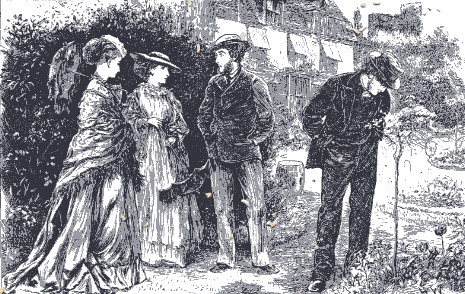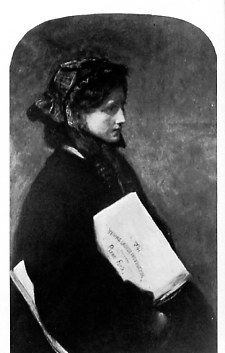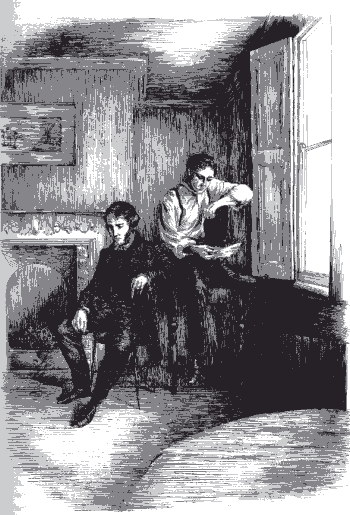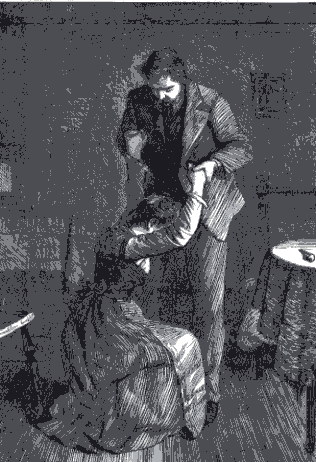Ellen and Jim Have a Blog, Too
We are two part-time academics. Ellen teaches in the English department and Jim in the IT program at George Mason University.


Trollope and Gender: the papers (3) · 1 August 06
Dear Marianne,
The third day was a 2/3s do: two sets of panels occurring at the same time for an hour and one half; a half-hour of refreshments, and then a 2 hour plenary roundtable discussion where 6 people were to talk for 5 minutes on the questions, Why read Trollope? and how justify paying people to teach Trollope in schools and colleges?, and then the audience was really to participate by responding to the panel members and the questions. While it seemed much less food for thought would be on offer, in fact one of the papers given at the session I attended if really taken seriously by critics and readers of Trollope reading community would transform how Trollope is read, and the plenary discussion included some of the most interesting and candid discussion I heard during all three days.
The revolutionary paper was Margaret Markwick’s "Out of the Closet: Homoerotic relationships in Trollope’s Novels." She began by stating she can find no homophobia in Trollope, but rather a strong endorsement of sexual desire as pleasurable and (when kept within the bounds of marriage) healthy. She argued that it was in the 20th century that a narrow and rigid idea of homoerotic behavior identified homosexuality with anal intercourse, and excluded all else. In Trollope she finds a continuum of flexible sexual behavior which includes homosocial and homoerotic relationships. Using Mark Turner’s analysis of Trollope’s short story, "A Ride Across Palestine" and "The Turkish Bath," she identified Orientalism as a coded vocabulary intended to suggest male genital homosexuality, and herself dwelt on pairs of males in The Vicar of Bullhampton (the Vicar, Frank Fenwick, and the man the heroine rejects, Harry Gilmore) and Castle Richmond (the adolescent boy, Sir Patrick Desmond and the tragic romance hero, Owen Fitzgerald who ends up isolated).
Rod Walter, Owen and Herbert Fitzgerald, Castle Richmond (1860)
In her five minutes on the plenary panel she indicated that a reader can make out sympathy on Trollope’s part for two semi-lesbian single women, Wallachia Petrie (a caricatured female suffragist) and Priscilla Stanbury (who retreats from a society which will give her no useful work to do with her considerable intelligence).
As in Prof Morse’s paper, the evidence presented in the argument felt very persuasive to listen to. My question to her was whether she was overreading aspects of Trollope’s use of intense emotionalism in his in-depth characterizations of personalities in extremis to allow us to read into them homoerotic relationships. I was also troubled by an optimistic stance similar to that in her Trollope and Women: she seemed to read all that was presented as sheerly beautiful and positive, with relationships projecting or leading to possibilities of sheer joyous fulfillment, while in Trollope there is much ambivalence towards all human relationships as based on dangers exploitations of power, as potentially and in fact often humiliating, destructive, and when thwarted neurotic or morbid. Trollope’s characters often get badly hurt as a result of their sexual needs.
Nonetheless, if she can make people read in Trollope’s fiction the perceptive humane flexible sexuality she sees, she will have done a remarkable service to Trollope readers. Her reading could attract a whole new audience for Trollope and new kinds of studies. I hope her book is published by Ashgate soon.

Henry Woods, the principals of The Vicar of Bullhampton (1868)
The panel Prof Markwick’s paper was part of was called "Regenderings." It included Prof Christopher Noble’s excellent paper on Trollope’s depiction of "masculinized" widows: Arabella Greenow, Madame Max Goesler, and Emily Lopez. He too presented a positive view, this time of these characters’ use of their sexual attractiveness and resistance to oppressive unsympathetic norms. The characters he chose all used what (contingent) power and resistance they had ethically or do not attempt to hurt anyone. I responded by instancing Lady Lufton’s attempt to maneuvre her son, Lord Lufton, into marrying the cold cruel Griselda Grantly, and her dismissal of Lucy Robarts as "unimpressive at a dinner table." Nick mentioned to me how Aunt Staubach harassed Linda Tressel to death.
I was troubled by the third paper which I may not have understood but seemed to deprecate the practical and intellectual gains of the 19th century liberal progressive movement (as seen in the work of John Stuart Mill) and recent 1970s feminist thought. It was implied that Catherine MacKinnon was against sexual fulfillment and Carol Pateman’s Sexual Contract wrong (!), and once again there seemed to be an avoidance of critiquing the pain Trollope’s characters’ use of power (female as well as male) inflicts on other characters. I guessed that there was a "third-wave" feminism point of view in the paper but am not sure.
The second panel on at the same time was called "Gender and Modernity," and there I missed a subtle and witty paper by Prof Ken Newton where he showed how Trollope undermines realism, and writes in a self-consciously post-modern sceptical and self-reflexive way. I know about the tones and quality of this paper since Prof Newton presented part of it as his 5 minute talk on the plenary panel.
What made the plenary session so good was many of the members of the audience really expressed their thoughts honestly and engaged in genuine dialogue with one another. The reasons given for reading Trollope and getting paid to teach Trollope were not surprizing: he’s readable, varied, had a long career in which he wrote rich, intelligent books alive to the central controversies of his and our era; he absorbs our minds and is practical; he teaches a decent ethics. One person argued wittily that we shoudl not read Trollope nor be paid to teach him since he is a dead white male and presents a world where only dead white males get to use their talents; the most wonderful women in his novels end up leading lives of dessicated spinsterhood, dull cowhood, or are presented in caricatures as thwarted, domineering, amoral harpies. Most amusing was David Skilton’s argument that we need first to counter and do away with as an utter distortion the Tory way of reading Trollope identified with the British Trollope Society.
Francis Arthur Fraser’s depiction of the hero and heroine in The Golden Lion of Granpere, a sunlit Oedipal story of French Catholic peasants (1867)
I can’t begin to report the statements made by all the people in the room over the two hours. I liked how Nick countered that in real life Trollope would’ve been against strikes, and many of his positions were conservative. A reiterated assertion by British people was that Trollope is still not respected by British academics. Trollope was defended as deep, poetic, not anti-semitic, broad and perceptive in his understanding of colonialism, and he was described as vulgar, keeping to the surface, using realism to exclude tabooed experiences. I talked of the difficulty of presenting his texts to African-American young men at the same time as I said (from experience) they were drawn to characters like Phineas Finn, men on the make, doubting disillusioned outsiders who are ambitious and successful.
I did want to defend the chairman of the Trollope Society, John Letts, from too much identification with the Tory way of reading. He was an unconventional man, remarkable and perceptive in his reading of Trollope, generous to me and others. I remember how he went to California to encourage a woman there who was building a small Trollope Society. He was willing to exploit the Tory way of reading to build a larger society and publish all Trollope’s fictions and much of his book-length and popular non-fiction in a uniform edition, and did just that. His initiatives put Trollope back on the cultural map and encouraged other publishers to publish Trollope’s novels too.
But alas I hadn’t the courage. I feared I might be seen as showing off a relationship I had with Letts, and my book (which partly came from this relationship); I’ve learned over the years on lists that it’s risky to bring up personalities other people have known. And it is true that the Trollope Societies attract wealthy conservative types. The activities planned are often very expensive (e.g., extravaganza trips, dinners at famous old places). You are expected to dress up a lot. Edward and I went once to a dinner at the New York Trollope Society and met many lawyers, bankers, and stockbrokers. At the same time we heard a wonderful paper by N. John Hall, a witty one by a man then in Parliament, and two years ago Steven Amarnick’s 1st paper revealing that the full or real The Duke’s Children we read is a much longer, richer, and more pessimistic work. So I place this defense here.
It was 1 o’clock and time for the meeting to end. People came up to one another to make contact, renew friendships and say adieu. These five to ten minutes included some of the pleasantest conversations I had for all three days. It seemed so many people had enjoyed themselves very much, been rejuvenated in their work, were glad they had come and hoped to see one another again. Me too. I believe I garnered 4 new members for Trollope-l, at least one of which may become an active participant.
For myself I was recognized as a Trollope scholar and person, made new friends and renewed some old acquaintances, and now think I will indeed go ahead and write my paper on "On Living in a New Country: Trollope’s North America and Australia and New Zealand and send it to that journal I was invited to send it to, The Antipodes.
I’ll be back to talk about the rest of the afternoon and my time in London on Thursday or Friday night.

J. E. Millais’s The Music Mistress, 1862—a woman who had to earn her daily bread.
I must to bed, Marianne,
Elinor
--
Posted by: Ellen
* * *
Comment
- From a member of Victoria:
"Dear Ellen Moody,
Thanks so much for posting your summaries of the Trollope conference. I haven’t read it all through yet, just skimmed. I am delighted to see it because I very
much wanted to go to the conference but lacked time, money, and a Trollope paper. This will let me see what I missed. And the photographs are great.
Sue Zemka"
— Elinor Aug 1, 9:14am # - On the coded vocabulary for homosexuality and lesbianism: in Virginia Woolf's Orlando, the opening of Chapter 3 (Orlando is an ambassador in Turkey), Woolf uses oriental imagery in just this homoerotic way. E.D. Edward has added Byron does too.
— Elinor Aug 7, 5:55pm # - From Chris Noble
"Ellen:
Now that I’m back in the States, I wanted to drop a line to thank you for your wonderful contribution to the Exeter conference. As a Trollope non-specialist, I learned a great deal from you. In fact, I probably learned more about Trollope in those three days than I did during my entire graduate education. Please feel free to pass along any suggestions of complex Trollopian widows for me to consider beyond those found in Palliser and Barset, especially any you can think of in the shorter fiction, which I have never read.
Cheers,
Azusa Pacific University
P.S. Lovely family photos on your web site."
— Elinor Aug 9, 10:49pm #
commenting closed for this article


